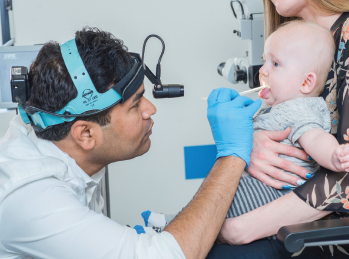The American Board of Otolaryngology-Head and Neck Surgery (ABOHNS) wants to provide an update about the progress toward subcertification in complex pediatric otolaryngology (CPO). This subspecialty is defined as the compendium of medical knowledge and care for:
Explore This Issue
August 2020- Children with complex otolaryngologic disorders, and/or
- Common otolaryngologic disorders in otherwise complex children.
A key tenet of CPO is that these children are, on many occasions, better suited for medical or surgical care in tertiary pediatric facilities within interdisciplinary teams. Subcertification in CPO isn’t intended to include the evaluation and management of all children with otolaryngologic disease, because the majority of pediatric patients can be treated by ABOHNS diplomates with primary certification in otolaryngology-head and neck surgery.
The effort to create the CPO subcertification started in the 1990s with its approval as a subcertification by the American Board of Medical Specialties (ABMS), followed by accreditation of fellowship training programs in pediatric otolaryngology by the Accreditation Council for Graduate Medical Education (ACGME). The number of accredited fellowship programs increased from four in 2001 to 30 in 2019, with more than 40 fellowship positions now available each year.
In January 2018, the ABOHNS formed the CPO steering committee as an advisory committee to the ABOHNS board of directors. The steering committee is composed of directors from the ABOHNS and leaders from the American Society of Pediatric Otolaryngology (ASPO). The ABOHNS directors include Kathleen C Y Sie, MD; Ronald B. Kuppersmith, MD, MBA; Jeffrey M. Bumpous, MD; and Marlan Hansen, MD. ASPO leaders include Kenny Chan, MD; Stacey L. Ishman, MD, MPH; and Diego Preciado, MD, PhD.
ABOHNS Subcertification Efforts

© LTH NHS TRUST / Science Source
The CPO steering committee has been working diligently over the past two years. Activities have included the following:
Establishing a process and eligibility requirements
The committee reaffirmed that the CPO subcertification process will include a written qualifying examination (WQE) and an oral certifying examination (OCE).
Eligibility criteria have been defined for the subcertification, which will include practice setting, case types, and participation in multidisciplinary activities. Once available, a document describing qualifying cases will be posted on the ABOHNS website. The training pathway will require completion of an ACGME-accredited fellowship and satisfaction of the eligibility criteria. The practice pathway does not specify a training requirement; candidates will be required to meet the eligibility criteria to take the examination. The practice pathway is anticipated to be open for seven years. (See “CPO Subcertification Eligibility Criteria” below.)
CPO Subcertification Eligibility Criteria
| Training pathway | practice pathway | |
|---|---|---|
| ABOHNS Primary Certification in good standing | Required | Required |
| Training | ACGME accredited fellowship within past 5 years | No requirement |
| Pass CPO Written Qualifying Exam | Required | Required |
| Practice Setting | Privileges at facility with NICU level 3 or equivalent | Privileges at facility with NICU level 3 or equivalent |
| Qualifying Cases | 50 index cases over up to 2 consecutive years | 100 index cases over up to 4 consecutive years |
| Multidisciplinary Activities, for example, cleft lip/palate clinic, VPI clinic, craniofacial clinic, NICU rounds, tumor boards | At least 12 times per year; can be from > 1 activity | At least 12 times per year; can be from >1 activity |
Defining a scope of knowledge
The scope of knowledge for CPO subcertification was created based on the core curriculum for pediatric otolaryngology fellowships. Public comments were solicited from pediatric otolaryngology program directors and representatives from ABOHNS-sponsoring societies to help delineate knowledge that is beyond the expectations of the primary certification in otolaryngology-head and neck surgery.
Generating written and oral examinations
The CPO subcertification WQE blueprint was created from the scope of knowledge document. The blueprint was finalized and approved by the ABOHNS board of directors after receiving input from pediatric otolaryngology fellowship program directors, chiefs of pediatric otolaryngology divisions, chairs of the pediatric and pediatric education committees of the AAO-HNS, and the ASPO president, along with four ASPO designees.
The CPO steering committee created a diverse CPO item writing working group composed of 25 pediatric otolaryngologists. These item writers are now in the second year of authoring items for the WQE.
The training pathway will require completion of an ACGME-accredited fellowship and satisfaction of the eligibility criteria. The practice pathway does not specify a training requirement; candidates will be required to meet the eligibility criteria to take the examination.
In addition, the CPO oral certifying exam working group was formed. This group is composed of members of the CPO steering committee plus five additional members from ASPO (Cristina Baldassari, MD; Carol J. MacArthur, MD; Anna H. Messner, MD; Richard Smith, MD; and Gregory J. Wiet, MD). The charge of this working group is to discuss the structural and process details for recommendation to the ABOHNS board of directors and to write oral exam protocols. The OCE will focus on the application of knowledge necessary for safe and effective practice in a tertiary care pediatric facility. Eligibility for this exam will occur after passing the CPO WQE and fulfilling all eligibility requirements in either the fellowship training or practice pathways.
The first CPO WQE is scheduled for July 29, 2021. Exam registration is expected to start in October 2020. The ABOHNS encourages those who are interested in applying for CPO subcertification to attend one of the informational virtual town hall meetings that will take place during the summer of 2020. Prospective candidates can find these dates, along with additional information, at www.abohns.org/Complex_Pediatric_Otolaryngology.html.
Dr. Nussenbaum is the executive director of the American Board of Otolaryngology-Head and Neck Surgery.